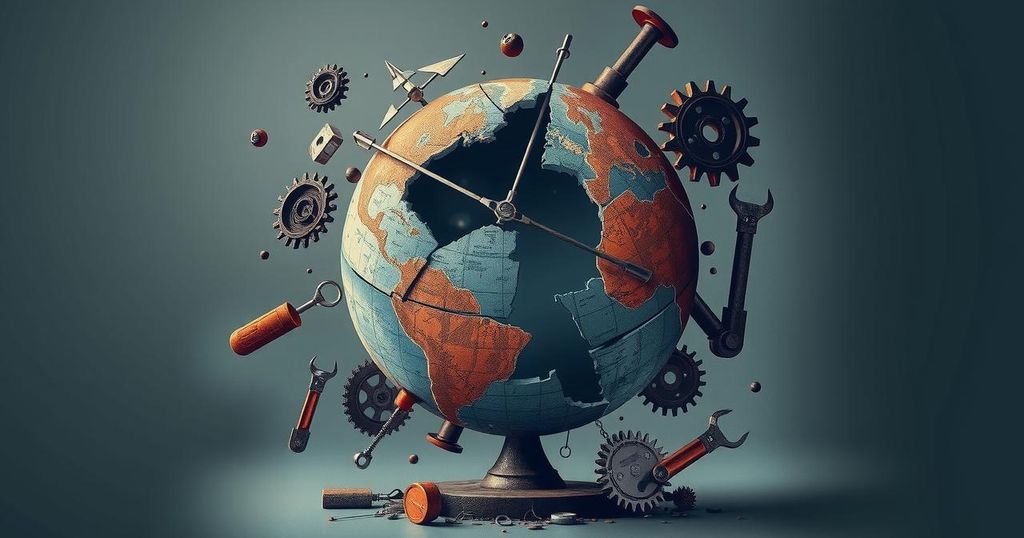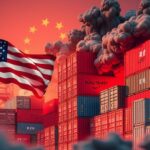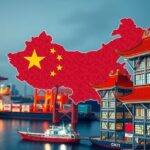Impact of US-China Trade War on India’s Manufacturing Sector
India’s manufacturing industry is struggling due to the US-China trade tensions, which have led to significant Chinese export restrictions that affect key sectors like solar power and electric vehicles. The reliance on Chinese components has resulted in delays and disruptions for Indian companies, highlighting vulnerabilities within India’s economic strategy. Ajay Srivastava notes these trade challenges can impact India’s growth prospects while intertwining with geopolitical concerns and national security strategies.
India’s manufacturing sector is facing challenges due to the escalating trade tensions between the United States and China, influenced by the impending Trump administration’s aggressive trade policies. The ‘Make in India’ initiative has spurred growth in essential segments like solar energy, electronics, and electric vehicles, all of which rely heavily on components and materials imported from China.
As China braces for a potential trade confrontation with the United States, it has enacted precautionary measures to signal its readiness for conflict. Significant restrictions on the export of crucial raw materials, especially rare earth minerals and machinery essential for solar panels, semiconductors, and electric vehicle parts, have been implemented, impacting not only the US but also third-party nations reliant on these exports to manufacture goods for American markets.
Beijing’s aggressive export bans include gallium and germanium, both critical for solar production, and antimony, significant for semiconductor technologies. Recent announcements have also included new restrictions on lithium extraction and battery materials, critical to electric vehicle manufacturing, further tightening the supply chain.
With the US reducing its dependency on China and looking towards India as an alternative supplier, the current situation has also affected Indian companies. Delays in receiving essential inputs due to Chinese export restrictions have been reported, especially in sectors like electronics and solar energy.
Ajay Srivastava, founder of GTRI, emphasized India’s vulnerability, stating “Indian firms in electronics, solar, and EV sectors are facing major delays and disruptions as China has blocked exports of inputs and machinery.” He highlighted the geopolitical implications of these trade actions and expressed hope for the quick resolution of restrictions that could also disadvantage China.
Despite growth in imports, which rose from $98.5 billion to $101.73 billion between 2022 and 2023, India’s stance on limiting Chinese investments following national security concerns remains firm. This policy change was implemented after the Galwan Valley conflict in 2020, mandating Chinese enterprises to obtain prior approval for investments, thereby complicating the situation further.
The trade tensions between the United States and China have significant implications for various countries, with India being particularly affected. The ‘Make in India’ initiative was designed to bolster domestic manufacturing capabilities, but its success is intertwined with Chinese supply chains. As tensions rise, the impact of export restrictions from China on India’s manufacturing sector becomes increasingly evident, revealing vulnerabilities in India’s economic strategy and international relations. China’s export restrictions not only aim to safeguard its interests but also serve as a warning to the United States regarding the repercussions of their trade policies. As global supply chains become more strained, countries like India must navigate their responses carefully to mitigate economic fallout while pursuing national security objectives. The situation reflects deeper geopolitical tensions and the complexities of international trade, impacting industries critical to India’s growth while revealing the challenges posed by reliance on foreign supply chains. Understanding these dynamics is essential for policymakers aiming to foster a robust manufacturing landscape in India.
In conclusion, the escalation of the trade war between the United States and China has adversely affected India’s manufacturing sector, particularly under the ‘Make in India’ initiative. China’s recent export restrictions pose significant challenges to Indian industries, which are heavily reliant on Chinese raw materials and components. The situation illustrates the delicate balance between economic growth and national security, as India continues to navigate the complexities of international trade amidst rising geopolitical tensions.
Original Source: www.ndtv.com








Post Comment